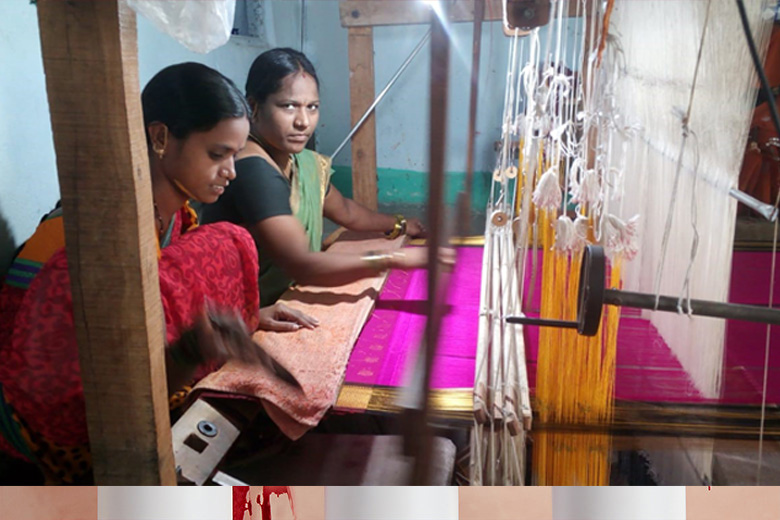
Amarchinta village stands proudly as the headquarters of Atmakur Tehsil in the newly established Wanaparthy district of Telangana State. Conveniently located just 18 kilometers away from Wanaparthy Railway Station and 25 kilometers from the Hyderabad Bangalore National Highway, Amarchinta is not only well-connected but also rich in cultural heritage.
During the early thirties, inspired by the artistry of Gadwal and Pochampally weaving traditions, a group of local artisans ventured to learn the craft. Upon returning, they established their own weaving units in Amarchinta and the neighboring villages, effectively forming an offshoot of the renowned Gadwal handloom mega cluster. Remarkably, even today, many of these unit owners maintain trade connections with Gadwal's master weavers, fostering a dynamic cluster twinning relationship. The weavers of Amarchinta exhibit remarkable skills, particularly in the realm of traditional pit loom weaving and the creation of exquisite silk saris. However, their expertise in crafting dress materials and blended saris remains relatively limited.
Amidst the challenges of being located in a drought-affected district with meager irrigation resources, Amarchinta has witnessed a significant outflux of people, especially among small-scale farmers, landless agricultural laborers, and members of the weaving community, since the late nineties.
Despite these challenges, weaving continues to be a cornerstone of livelihood in Amarchinta and its neighboring villages. With a total population of approximately 15,000 spread across 3,200 families, including 315 families from the weaving community, the village's artisans remain heavily reliant on the traditional craft of handloom weaving for their sustenance.
Support Under SFURTI Scheme
Recognizing the potential of the Amarchinta Silk Handloom Cluster, various agencies came together to support its revitalization. The Nodal Agency – M/s. Foundation for MSME Clusters, Technical Agency – M/s DSLR Consultancy Pvt. Ltd., and Implementing Agency – Rural Development Society, collaborated to identify this cluster as a candidate for benchmarking intervention. Through a strategic plan developed between October 2019 and December 2020, the interventions were categorized into two key parts: Soft Interventions and Hard Interventions.
Soft Interventions encompass skill development programs, market promotion initiatives, and more. A budget of Rs. 17.44 lakh was allocated to these activities. The Hard Interventions, on the other hand, focus on setting up a Common Facility Centre (CFC), supporting individual artisans, and establishing essential infrastructure. The following is a breakdown of the Hard Interventions:
Common Facility Centre: A dedicated building for the CFC - Looms: Procurement of 50 Jacquard looms - Garmenting Section: Outfitting with 16 machines and working tables - Card Punching Machine: For looms - Design Centre: Envisioning creative possibilities - Support to Individual Artisans: Equipping with 85 Jacquard looms - Raw Material Bank: To serve both CFC and individual artisans –
A generous Grant-in-Aid of Rs. 181.06 lakh (covering 90% of the Hard Intervention costs) has been extended to support these initiatives, with the Ministry of MSME, Government of India, under the SFURTI Scheme, providing the remaining costs, including Soft Interventions and administrative expenses.
Current Status:Progress is evident as the CFC building has been completed, and the Garmenting Section is now ready for use following training. Installation of looms at the Common Facility Centre is ongoing and expected to conclude by the end of August 2021. While 50% of the proposed looms for individual artisans are already installed, the remainder are in the process of installation.
Impact of the Program:The intervention's potential impact is substantial. The cluster's turnover is projected to grow by Rs. 5.5 crore, resulting in a 30% increase in the artisans' income. This uplift is anticipated within just one year, elevating their daily earnings from Rs. 250 to Rs. 325.
Additional Support:Under the SFURTI Convergence Plan, NABARD has provided support through the Rural Mart Scheme to establish a showroom at the cluster location.
Committed to the cluster's holistic development, the Nodal Agency, Technical Agency, and Implementing Agency are poised to offer further support. This includes implementing Lean Manufacturing practices, digitizing cluster operations, and actively marketing and selling the cluster's products.
Amarchinta Silk Handloom Cluster stands as a shining example of collaboration and empowerment. As it continues to weave its journey toward prosperity, it epitomizes the resilience and creativity of India's artisan .